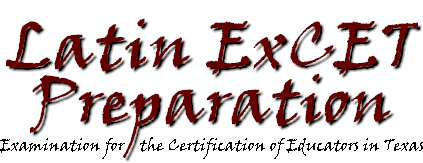 |
 |
||||||||||||||||
|
Indirect
Statement
I. Occurs after verbs of saying, thinking, knowing, and perceiving. II. Verb becomes infinitive. III. Subject of verb becomes accusative. Example: Ego laudo. I praise. Scio me laudare. I know that I praise. IV. Tense of infinitive.
Sample ExCET-type questions: 1. Fill in the blank in the sentence below: Dixit suum amicum numquam ______________.
Answer: d, because the indirect statement requires the infinitive mentitum esse.
2. Fill in the blank in the sentence below: Marcus putavit ____ patriam servavisse.
Answer: c, because the indirect statement requires the accusative subject te.
3. Plinius dixit se scholam conditurum esse. Pliny:
Answer: b, because the future infinitive conditurum esse states that the action in the indirect statement happens after the main verb dixit. |
||||||||||||||||
|
Latin ExCET Home Page | Main Menu | TCA Home Page This site was re-created September 1998 by Ginny Lindzey, Webmistress, Texas Classical Association. To report problems please contact Ginny at ginlindzey@lindzey.us |
||||||||||||||||
